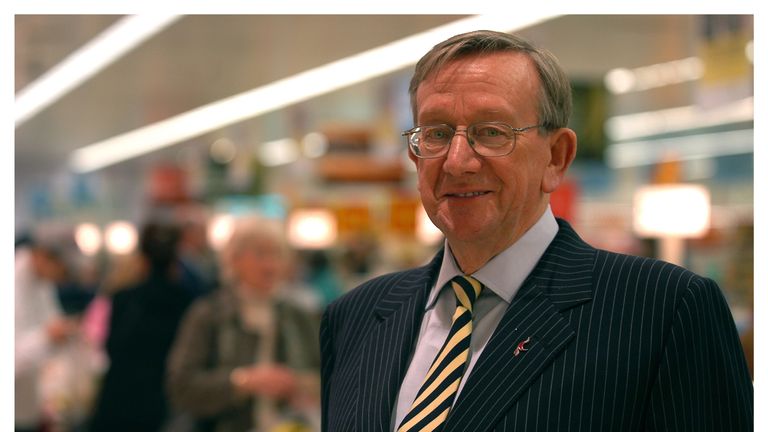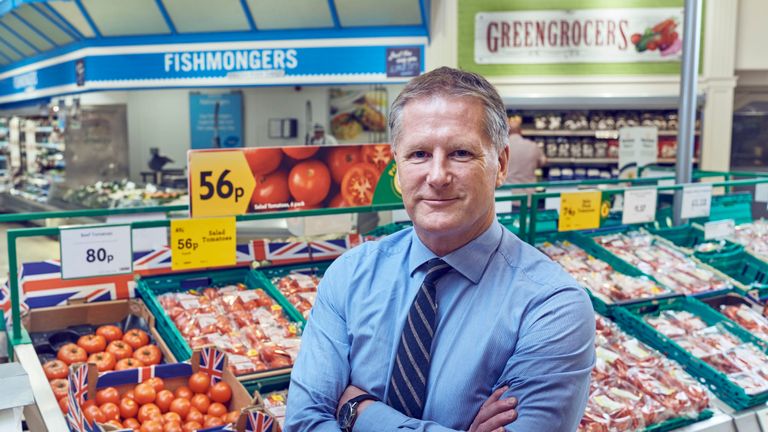Sir Ken Morrison left a legacy to be proud of
The former boss of Morrisons was a force to be reckoned with, and his genius as a retailer lay in his instincts, writes Ian King.
Wednesday 1 February 2017 17:41, UK
It is no exaggeration to say that Sir Ken Morrison, who has died at the age of 85, is one of the most influential figures in British retailing during the last 60 or 70 years.
He stands alongside Jack Cohen, John Sainsbury, Simon Marks and John Spedan Lewis as one of the all-time greats - a man who built a vast retailing empire that has endured over many decades and that touches the lives of millions of people on a daily basis.
Working well into his 70s, he was respected, admired and at times feared by his peers.
Allan Leighton, the former Asda chief executive, said he was the toughest competitor he faced.
Sir Terry Leahy, the man who led Tesco to become the world's second-largest supermarket, once joked that, if he was running the business at the age of 70, he would still find himself up against Sir Ken.
Sir Ken's genius as a retailer lay in his instincts. He was famous for roaming the aisles of his stores and tearing open packets of sandwiches to check on their freshness.
More worrying for his supermarket managers was the sight of him rummaging around in the skip at the back of the store - and woe betide them if he ever found anything that had been thrown out when it was still fit for sale.
Sir Ken did not found Morrisons. The origins of the business date back to 1899, when his father, William, began selling eggs and butter on a Bradford market stall.
This had evolved into a handful of stores when, in 1956, ill-health forced William to retire.
Sir Ken, who had begun working for the business on a full-time basis four years earlier after completing his national service, immediately became boss.
He opened his first "self-service" store two years later and, in 1961, its first supermarket.
The company floated on the stock market in 1967 and went on to deliver year after year of unbroken profits growth, expanding at such a rate that by the end of 1999, it had 100 supermarkets.
Among the many things that marked out Morrisons from its rivals was a fresh food offer widely recognised as the best in the industry.
The company was also vertically integrated, owning much of its own food production and packing facilities, including its own abattoirs.
The "market street" concept, showcasing all this and which lasts to this day, was Sir Ken's creation.
At 2003, when most of his contemporaries were happily knocking balls around a golf course, Sir Ken made the biggest move of his career with a bid for his larger rival, Safeway.
At the time, Morrisons was still predominantly a northern business, with barely any stores south of Watford Gap.
After a year-long bid battle, during which Tesco, Sainsbury's, Asda and Sir Philip Green all tabled proposals to take over Safeway, Sir Ken emerged triumphant and at the helm of the UK's fourth-largest supermarket chain.
Yet the business proved difficult to integrate - the takeover saw it triple in size - and, in 2004, Morrisons issued its first-ever profits warning.
Sir Ken famously disdained management consultants, public relations advisers, investment bankers and the legions of staff that all go with running the modern plc.
For most of his time at the helm, City analysts and investors had to make do with speaking with him on the telephone or, if they wanted a face-to-face meeting, paying a visit to what one adviser described as "world headquarters in Bradford".
After paying a very rare trip to the City in the early 1990s, to hold a meeting with analysts, the legend has it that he got on the train back to Bradford and said "I'm not bloody doing that again".
Asked once on his approach to opening new stores, he growled: "Well, we get on a bus and we look for chimney pots."
Despite being listed for many years, Sir Ken also refused to appoint non-executive directors, arguing that, for the price of one, he could hire a couple of check-out staff.
He revelled in playing up to the stereotypical image of a no-nonsense, blunt-speaking, penny-pinching Yorkshireman.
That approach did not hold him back even after Morrisons joined the FTSE-100 in 2001.
However, when it became clear that the business had become too big to manage following the Safeway deal, things had to change.
PR advisers were appointed, non-executive directors joined the board and Sir Ken started appearing in the City more frequently.
After he stepped down from the business in 2006, succeeded by the Heineken executive Marc Bolland, a lot of shortcomings became apparent.
Morrisons had no online offering - Sir Ken famously said that, having started out delivering groceries on a bicycle, he had no intention of going back into home delivery - and no convenience offering.
Attempting to put that right proved costly.
None of that, though, should detract from Sir Ken's remarkable achievement in building a small Yorkshire-based family business into one of the UK's biggest companies.
As Clive Black, food retail analyst at Shore Capital - the broking adviser to Morrisons - notes: "Without Sir Ken, many hundreds of thousands of British families and businesses would not have had their working and commercial livelihoods; many folks will be thankful to him this day."
It is truly a legacy of which to be proud.





